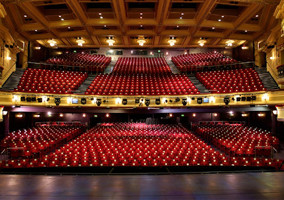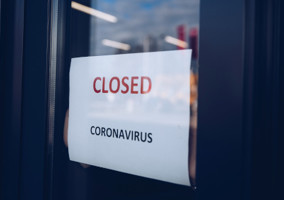Britain’s arts, culture, and heritage industries will receive a £1.57bn rescue package to help weather the impact of coronavirus, the government has announced.
The prime minister, Boris Johnson, said: “This money will help safeguard the sector for future generations, ensuring arts groups and venues across the UK can stay afloat and support their staff whilst their doors remain closed and curtains remain down.”
This package includes a £1.15bn support pot for cultural organisations in England delivered through a mix of grants and loans. This will be made up of £270m of repayable finance and £880m grants.
It also includes £100m of support for the national cultural institutions in England and the English Heritage Trust. A further £120m will be aimed at restarting construction on cultural infrastructure.
Decisions on awards will be made alongside sector bodies such as Arts Council England and other specialist bodies such as Historic England, the National Lottery Heritage Fund and the British Film Institute.
Oliver Dowden, culture secretary, said: “Our arts and culture are the soul of our nation. They make our country great and are the lynchpin of our world-beating and fast growing creative industries.
“I understand the grave challenges the arts face and we must protect and preserve all we can for future generations. Today we are announcing a huge support package of immediate funding to tackle the funding crisis they face. I said we would not let the arts down, and this massive investment shows our level of commitment.”
Arts charities already facing financial pressure
The funding comes after many arts charities and other cultural organisations warned that they were facing extreme financial pressures due to coronavirus restrictions.
One of them, Southampton’s Nuffield Theatre, has already gone into administration.
Greg Palfrey and Steve Adshead of Smith & Williamson LLP were appointed as joint administrators on 6 May 2020.
Meanwhile, the Theatre Royal Plymouth said last month that it will be starting the process of redundancy consultations.
A statement on Twitter reads: “We’re incredibly sad to share the news with you that we’ve had to take the painful step of starting redundancy consultations at TRP yesterday. Every member of the TRP family is valued and talented and we’ll be doing all we can to support colleagues through this challenging time.”
We’re incredibly sad to share the news with you that we’ve had to take the painful step of starting redundancy consultations at TRP yesterday. Every member of the TRP family is valued and talented and we’ll be doing all we can to support colleagues through this challenging time. pic.twitter.com/fIfEuXB5mp
— Theatre Royal Plymouth (@TRPlymouth) June 23, 2020
Birmingham Hippodrome has also had to scale back areas of the business as a result of the coronavirus pandemic, with about 60 members of staff at a theatre could be made redundant in an attempt to save the venue.
The theatre, which currently employs about 130 members of staff, said it had entered a period of redundancy consultations.
The theatre tweeted it was delighted on hearing the news of the support package, but would need further details to know whether this might help the theatre.
We are completely overjoyed by the news this evening that £1.57 billion will be invested by the UK Government to protect our world-class cultural, arts and heritage institutions.
— Birmingham Hippodrome (@brumhippodrome) July 5, 2020
Please see some words from our Artistic Director and CEO @Fiona_Allan below 👇 pic.twitter.com/EwSL9R9eGe
Cash injection ‘shows that the government is listening’
The Royal Albert Hall had warned that it will run out of money by its 150th anniversary next year without urgent help.
Craig Hassall, chief executive of the Royal Albert Hall, said: “The three things that we in the cultural sector have been asking for are an injection of cash into the industry while we’re unable to operate, an extension of the Job Retention Scheme, and an indicative timeframe for re-opening venues, so that we can model with more certainty.
“This announcement promises the cash injection, and that’s a very encouraging sign – it shows that the government is listening to the sector and we hope that the application process will be as simple and quick as the JRS was.
“We also urgently need to know when live performance with an audience might be possible, now that pubs, planes and cinemas are all open and are pleased that government is finalising guidance for a phased return of the performing arts.
“The creative industries are a vital part of the UK economy – contributing £111bn in 2018, according to the government’s own figures – and while this is a very welcome first step, much more work is going to be needed to put the cultural sector back on its feet.”
Julian Bird, chief executive of the Society of London Theatre and UK Theatre, said: “The government’s announcement of a £1.57bn package of support for the arts, culture and heritage sector in the UK is hugely welcomed – for the theatre and performing arts sector, we have worked intensively with DCMS and HMT to seek this clear commitment to our world-leading industry and we thank them.”
Bird added that the theatres “look forward to clarity of how these funds will be allocated and invested, so that artists and organisations can get back to work as soon as possible”.
Similarly, Mark Cornell, group chief executive of Ambassador Theatre Group, said: “It is essential that these funds are made available to all areas across the cultural ecosystem, from the subsidised sector to independent contractors, artists, producers, technicians and venue operators.”
Sir Simon Rattle, music director of the London Symphony Orchestra, said: “This is wonderful news and a huge relief for us all. This generous investment is both enormously welcome and desperately needed. Now that our survival is no longer at risk, we can start rebuilding our cultural life.
“We are an immensely interconnected industry, so it is important that these funds percolate from the grassroots up, so that the whole landscape can be nourished, and we hope it will be distributed as fast as possible. Preferably faster, as so many institutions and individual artists have been staring into the abyss.”












